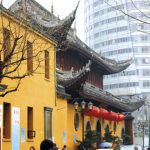SHANGHAI—Loved and Lost
A Novel by Elizabeth Shaen Colterjohn
Reviewed by Carol L. Bowman

From the historical perspective, I applaud Libby Colterjohn’s extensive research into events and clashes of world players that molded China into the powerful nation it is today. Much of the book chronicles the complex engagement of Nationalist Party politics under Chiang Kai Shek, the frequent aggression by Japanese Imperialists and the country’s eventual fall to Communism under Mao-Tse-Tung in 1949. History buffs might appreciate this comprehensive review of China’s struggle for a national identity
Woven into the fabric of these bygone days, the significant role that Shanghai played, as an international treaty port, provided the backdrop for the personal story of Sam and Eric Colterjohn, young engineers who moved to Shanghai to work, play and raise their families. Detailed descriptions of the decadence and high-flying, privileged life style enjoyed by foreigners in Shanghai during the late 20’s and early 30’s, brought this international city of sin and intrigue to life.
The book’s cover photo of a Chinese junk, illustrated by local photographer Antoinette Bullock, perfectly sets the stage, creating an image of elusive Shanghai, completely distinct from any other part of China.
Written from the voice of Duncan Colterjohn, the author’s husband, and son of the principle player, Eric, Libby tackled an almost impossible literary task. She used Shanghai born, Duncan to narrate the exploits of the family in the International Settlement and beyond. Regrettably, Duncan died before the book was completed, creating weaknesses in the richness of detail and frequent structural change of POV (point of view). “I felt that I did not have the credibility to say some of the things I needed to say in my own voice, so I changed to Duncan as the narrator,” she said. His mother, brother and Duncan were forced to flee Shanghai to Canada for safety in 1941, shifting his narration away from Shanghai for the remainder of the story.
One salient fact wasn’t mentioned in the book. Duncan’s classmate at the Cathedral School in Shanghai was J.G. Ballard, whose semi-autobiographical novel inspired the character of Jim, the young British lad interned in the Japanese Lunghua Camp for Steven Spielberg’s 1987 film, Empire of the Sun. Readers who saw this movie could have identified immediately with the plight of the Colterjohn family; a fascinating connection.
For me, the most poignant segment of the book deals with the universal theme of those returning home after war. Passages that sprang from conversations Libby had with her father-in-law, Eric, upon his liberation from the Japanese Internment Camp outside Shanghai and repatriation back to London, depicted Eric’s feelings of uselessness, his inability to adjust and the impact on the family.
I look forward to Elizabeth Shaen Colterjohn’s new book, All the World’s A Stage, written entirely from her own POV, exploring the adventures she, Duncan and their four children experienced living in Malaya and Zambia.
Shanghai—Loved and Lost—available on Kindle ($ 2.99), Amazon POD ($7.99) and locally at Diane Pearl Collections and Nueva Posada for 130 pesos. Genre: Narrative Non-Fiction!
- April 2024 – Issue - March 31, 2024
- April 2024 – Articles - March 31, 2024
- April 2024 - March 31, 2024









